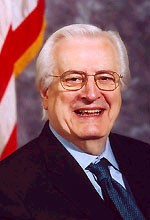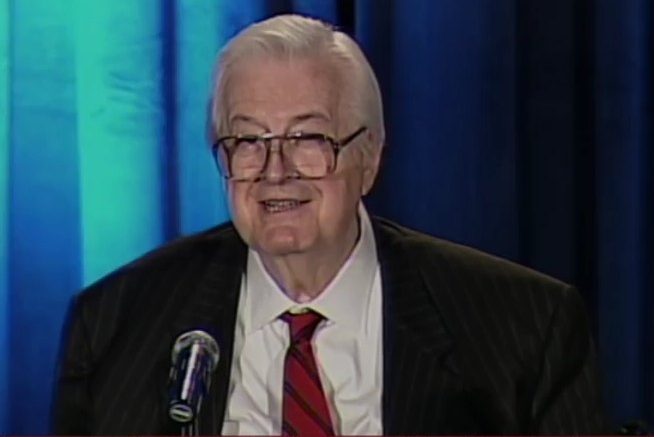Henry J. Hyde, Congressman
One of the great errors of modern politics is our foolish attempt to separate our private consciences from our public acts, and it cannot be done. At the end of the 20th century, is the crowning achievement of our democracy to treat the weak, the powerless, the unwanted as things? To be disposed of? If so, we have not elevated justice; we have disgraced it. Congressman Henry Hyde, speaking on partial-birth abortion.
The right of conscience and private judgement is unalienable and it is truly the interest of all mankind to unite themselves into one body for the liberty, free exercise, and unmolested enjoyment of this right.” Ezra Stiles (1727-1795).
“The civil rights of none shall be abridged on account of religious belief or worship, nor shall any national religion be established, nor shall the full and equal rights of conscience by in any manner, or on any pretext infringed. James Madison, original draft of the First Amendment.
James Madison failed at his task of securing an explicit right of conscience in the Constitution. Nevertheless, it is comforting today to encounter men and women of conscience. Such was Henry J. Hyde.
 Henry Hyde (April 18, 1924 – November 29, 2007) was an American politician best known for sponsoring an amendment, now bearing his name,[1] which outlawed the use of federal funds in performing abortions. Over the years, Congress altered the Hyde Amendment several times, but repeatedly passed it nevertheless.
Henry Hyde (April 18, 1924 – November 29, 2007) was an American politician best known for sponsoring an amendment, now bearing his name,[1] which outlawed the use of federal funds in performing abortions. Over the years, Congress altered the Hyde Amendment several times, but repeatedly passed it nevertheless.
Although the Hyde Amendment was immediately challenged in the courts, the Supreme Court upheld its constitutionality in Harris v. McRae. The Court stated:
The funding restrictions of the Hyde Amendment do not impinge on the “liberty” protected by the Due Process Clause of the Fifth Amendment held in Roe v. Wade, 410 U.S. 113, 168, to include the freedom of a woman to decide whether to terminate a pregnancy. . . .
Regardless of whether the freedom of a woman to choose to terminate her pregnancy for health reasons lies at the core or the periphery of the due process liberty recognized in Wade, supra, it does not follow that a woman’s freedom of choice carries with it a constitutional entitlement to the financial resources to avail herself of the full range of protected choices.
On July 21, 2016, the Democratic Party of the U.S. issued its 2016 platform, containing, for the first time, an explicit call to repeal the Hyde Amendment.[2] Seemingly in response, six months later on January 24, 2017, the House of Representatives passed H.R. 7, which, according to the press office of Speaker Paul Ryan, “makes the Hyde amendment permanent.”
For his steadfast opposition to abortion, after announcing his retirement from Congress in 2006, Representative Hyde was named a Papal Knight of the Order of St. Gregory the Great by Pope Benedict XVI. After leaving office the following year, he received the Presidential Medal of Freedom, the nation’s highest civilian honor from President George W. Bush. Hyde could not attend the award ceremony in person as he remained hospitalized after open-heart surgery, complications of which shortly led to his death at age 83. The Presidential Medal of Freedom citation read:
A veteran, a lawyer, and a public servant, Henry Hyde has served his country with honor and dedication. During his 32-year career in the House of Representatives, he was a powerful defender of life, a leading advocate for a strong national defense, and an unwavering voice for liberty, democracy, and free enterprise around the world. A true gentleman of the House, he advanced his principles without rancor and earned the respect of friends and adversaries alike. The United States honors Henry Hyde for his distinguished record of service to America.[3]
“Veteran” referred to Hyde’s service in the U.S. Navy during WWII and his continued service in the Naval Reserve from 1946 to 1968, ending in command of a U.S. Naval Intelligence Reserve Unit in Chicago and retirement at the rank of Commander (O-5).
As a public servant, Hyde served first in the Illinois House of Representatives (1967-1974) including a stint as Majority Leader from 1971 to 1972, and then represented Illinois’ 6th District in Congress for the next 32 years, from 1975 to 2007.
Beyond the 1976 Hyde Amendment, Hyde is perhaps best known for his efforts in leading the impeachment of President Bill Clinton in 1998. When the Lewinsky Scandal[4] first became public, Hyde apparently did not take calls to impeach Clinton very seriously; he considered the issue to one of be sexual misconduct and not a concern of Congress.[5] That changed after Clinton boldly lied to the House Judiciary Committee, stating that he had not had sexual relations with “Ms. Lewinsky” — with Hyde sitting before him as chairman of the committee! Hyde skillfully led House “managers” in successfully passing an impeachment resolution and sending the case to the Senate for trial where, despite Hyde’s efforts as chief prosecutor, Clinton was acquitted of perjury and obstruction of justice charges. Hyde ended his closing argument in the Senate trial by stating:
“A failure to convict will make the statement that lying under oath, while unpleasant and to be avoided, is not all that serious…We have reduced lying under oath to a breach of etiquette, but only if you are the President…And now let us all take our place in history on the side of honor, and, oh, yes, let right be done.”
Once more, a call to conscience.
Over the years, Hyde also waged vigorous battles against flag-burning, doctor-assisted suicide, and same-sex marriage. Speaking out about partial-birth abortion, Hyde eloquently stated:
This is not a debate about sectarian religious doctrine or about policy options. This is a debate about our understanding of human dignity, what does it mean to be human? Our moment in history is marked by a mortal conflict between a culture of death and a culture of life, and today, here and now, we must choose sides.
A graduate of Georgetown University, Hyde later earned his law degree from Loyola University Chicago, a Jesuit Catholic University. In 1947, Hyde married the former Jeanne Simpson Together they had four children, who brought them four grandchildren. Jeanne died in 1992 and Henry soon married the former Judy Wolverton. No further children issued.
When Hyde died on November 29, 2007, Crisis Magazine began a collection of online condolences. They paint a picture or a remarkable patriot:
“… one of the rarest, most accomplished, and most distinguished Members of Congress ever to serve.”
“… one of the great leaders of America’s modern age.”
“…the most eloquent defender of the right to life who ever served in the United States Congress.”
“…the greatest Catholic statesman of our generation.”
“His courage should be an example for us all.”[6]
Perhaps this short bio should end, as it began, with the words of Congressman Henry Hyde:
When the time comes as it surely will, when we face that awesome moment, the final judgment, I’ve often thought, as Fulton Sheen wrote, that it is a terrible moment of loneliness. You have no advocates, you are there alone standing before God – and a terror will rip through your soul like nothing you can imagine. But I really think that those in the pro-life movement will not be alone. I think there will be a chorus of voices that have never been heard in this world but are heard beautifully and clearly in the next world – and they will plead for everyone who has been in this movement. They will say to God, ‘Spare him because he loved us,’ – and God will look at you and say not, ‘Did you succeed?’ but ‘Did you try?’
Amen.
Gary Porter
Executive Director
Constitution Leadership Initiative
“The nature of the encroachment upon American constitution is such, as to grow every day more and more encroaching. Like a cancer; it eats faster and faster every hour. The revenue creates pensioners, and the pensioners urge for more revenue. The people grow less steady, spirited and virtuous, the seekers more numerous and more corrupt, and every day increases the circles of their dependents and expectants, until virtue, integrity, public spirit, simplicity and frugality become the objects of ridicule and scorn, and vanity, luxury, foppery, selfishness, meanness, and downright venality swallow up the whole of society.” John Adams
Note: this essay was first published as part of Constituting America’s 90-Day Study for 2018.
[1] This “Hyde Amendment” should not be confused with the Hyde Amendment of 1997, which dealt with an entirely different matter.
[2] http://www.presidency.ucsb.edu/papers_pdf/117717.pdf
[3] https://georgewbush-whitehouse.archives.gov/news/releases/2007/11/20071105-7.html
[4] https://en.wikipedia.org/wiki/Clinton%E2%80%93Lewinsky_scandal
[5] Hyde had himself confessed to an adulterous affair that had taken place in the early 1960s before he entered public life, calling it a “youthful indiscretion[].”
[6] https://www.crisismagazine.com/2007/remembering-henry-hyde-2

